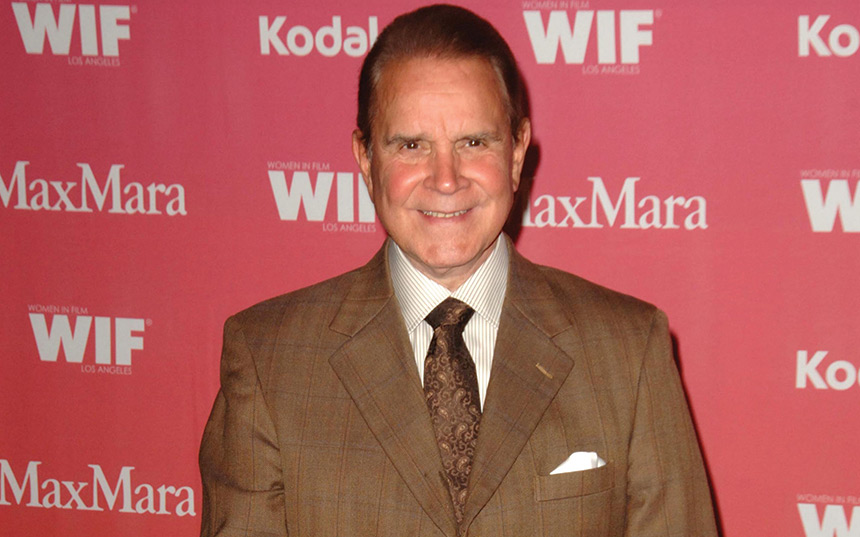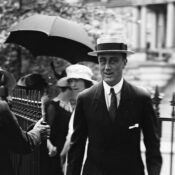Rich Little got famous doing dead-on and often very funny impressions of the famous, from movie stars to presidents. His long-running act at the Tropicana in Las Vegas has been a showcase for his ability to leave ’em laughing. And he’s done the same on tours around the world as well as on screens big and small.
Whether taking off on Jimmy Stewart, Clint Eastwood, Ronald Reagan, or Arnold Schwarzenegger, to name a few of his favorites, Little has displayed an uncanny ability to literally become the icons he’s having fun with. And what better evidence than the Canadian’s swearing-in ceremony to become a U.S. citizen: The judge asked him to take the Pledge of Allegiance in the voice of John Wayne — and of course he did.
Like performers everywhere, Little is finding new ways to display his talent during the pandemic without the audiences he loves. In the meantime, fans can get an updated glimpse of his fascinating career in a new release of his autobiography, People I’ve Known and Been: Little by Little.
Jeanne Wolf: How did you get started doing the impressions that would bring you a lifetime of success?
Rich Little: I began imitating teachers at a very young age, and it wasn’t long before some of the teachers got a kick out of it and asked me to imitate them. I remember I wanted a date with a girl and I did an impression of her favorite movie star. Fortunately, it wasn’t Lassie. Then I was working as a disc jockey and I did impressions of a lot of movie stars, and people came to the station expecting to see them. I think I got booed one day when they found it was just me.
I started drawing portraits when I was about 15. I would sit on a bus and sketch other passengers, and when I got off I would hand it to the person. They would usually rip it up. I’ve done hundreds and hundreds since, including all the famous people I’ve impersonated. Actually, drawing someone and doing an impression of them are similar in a lot of ways.
JW: Two of your favorites over the years have been Ronald Reagan and Johnny Carson. What made them great?
RL: With Reagan, you never felt you were talking to the president. He was like a lovable grandfather. He liked to tell jokes and would see the humor in almost everything. I asked him, because I’d read it, “Is it true that you were once considered to play the lead in Casablanca?” And he said to me, “No, that’s not true. I think they really wanted Ingrid Bergman for the role.” When you met him, he’d start off with a joke. Then I’d tell him one. He’d go, “That’s hysterical. I’m going to tell it to Gorbachev.”
“My wives didn’t know who they were married to because I was so many people.”
Johnny Carson was the best talk show host of all time. As a person, he was quite different than he was on camera, very aloof and not terribly friendly. He kept to himself and didn’t have many friends. But when the camera was on, he was brilliant. I remember meeting him years after he retired, and he went, “Are you still doing me in your act?” And I replied, “All the time!” “So they still remember me?” I said, “Of course they remember you, you’re an institution.” Johnny took a beat and said, “That’s where I should be, in an institution.” In spite of his stardom, he was always insecure.
Most of the famous faces I’ve done have never had a problem with the way I portrayed them. Paul Lynde of Hollywood Squares was the exception. He didn’t like my impression of him at all. In fact, he hated it. He used to say to the audience, “His sister does me better than he does.” I said, “Paul, I don’t have a sister.”
JW: You are famous for impersonating some of the great movie stars of the past. What about the current crop?
RL: It’s more of a challenge. Now there are a lot of stars that don’t have distinctive voices. The actors of the ’40s and ’50s were more identifiable, and they usually played the same sort of part in every movie. The greats like John Wayne, Humphrey Bogart, Clark Gable, and James Cagney were unique. Not so much today, though. It’s tougher to get a handle on what traits set them apart. The key to doing a good impression is finding that. George Clooney, Brad Pitt, and Matt Damon, I just give up on.
Whether you’re a success or not depends on what you think you’ve accomplished. There are a few areas that I consider I could have done better in, you know, like I only made a couple of movies. I never was on Saturday Night Live. And there’s a few things that I kind of regret, but not many.
Cary Grant once said to me, “You can make people laugh and forget their problems. That’s very rare.” There’s a lot of things today in the world that aren’t very pleasant. So if an audience goes out of a show going, “God, that was great. I was laughing my head off,” that’s all I really need.
JW: Your dad was a doctor. Did he give you any advice that has guided you over the years?
RL: He didn’t give me a lot of advice. But a couple of times I went into the operating room with him as a kid. He said, if you’re going to faint, faint back. Don’t faint on the patient. He knew I’d never follow in his footsteps because I couldn’t stand the sight of blood.
JW: You’ve been through a few marriages. Any thoughts about why things didn’t work out?
RL: I’m living alone now. The big love of my life was my third wife, and if she hadn’t passed away, I’d still be married to her. She was the greatest. I went on to marry again and that didn’t work out. I’ve given up on marriage now. The last marriage I had, they threw Minute Rice. All my wives have been different, and maybe the problem was they didn’t know who they were married to because I was so many people.
JW: How do you feel about the no-holds-barred, anything-goes direction a lot of comedians seem to be taking?
RL: Comics today can say anything they want, even on TV. Back when I was I starting out you couldn’t even say damn. I don’t think it makes a routine better or funnier. Anybody can walk out on stage and spout a stream of four-letter words.
This is the complete version of an interview that ran in the November/December 2020 issue of The Saturday Evening Post. Subscribe to the magazine for more art, inspiring stories, fiction, humor, and features from our archives.
Featured image: s_bukley / Shutterstock
Become a Saturday Evening Post member and enjoy unlimited access. Subscribe now



